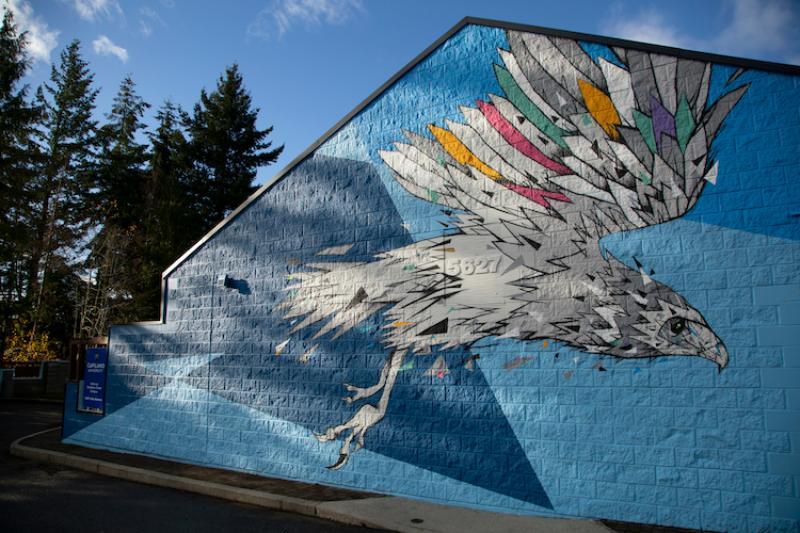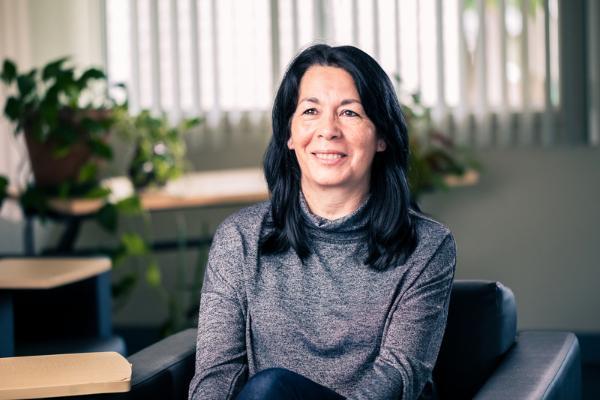Capilano University and shíshálh Nation partner to establish Indigenous arts mastery program

News release: Capilano University announces new Indigenous arts program at kalax-ay campus (PDF)
North Vancouver B.C. September 14, 2023 – Capilano University (CapU) is pleased to announce that, in partnership with the shíshálh Nation, the University is establishing a new Wood/Silver Carving and Plant Medicine program at kálax-ay, CapU's Sunshine Coast campus in Sechelt, British Columbia. The new Carving Shed: Supporting Indigenous Arts Mastery (SIAM) program is made possible through funding from a Native Creative Development program grant from s’gʷ gʷiɁ altxʷ House of Welcome Cultural Arts Center in Washington state. kálax-ay is the first post-secondary campus in the Pacific Northwest to establish an Indigenous-led teaching and learning centre of this kind.
CapU and the shíshálh Nation are establishing this program with the shared goal of creating a place where Indigenous students can connect to their culture and learn from shíshálh community members. The objective is to establish two year-long courses in carving and plant medicine; recruit 10 Indigenous students per course per year, focusing on students from the shíshálh Nation, totaling 40 students over the life of the grant; and evaluate the success of the course training using culturally safe, decolonized practices.
The Carving Shed: SIAM program will establish an on-campus dedicated space to learn carving and create a plant medicine garden for Indigenous students and artist–instructors to work and learn together.
“I am so thankful and excited that our dream of a Carving Shed and Plant Medicine program has come true. To give our students the opportunity to feel safe in their own environment while learning with artists, Elders and community members is an amazing gift,” said Jessica Silvey, Indigenous faculty advisor at the CapU kálax-ay campus. “There is a lot of talk about Reconciliation, which is mostly just words, but this partnership between the shíshálh Nation and kálax-ay, the Sunshine Coast Campus of Capilano University shows what can be achieved when we work together.”
Photo of Jessica Silvey, Indigenous faculty advisor at the CapU kálax-ay campus
The Native Creative Development Program grant aims to encourage creative development for Indigenous artists in the Pacific Northwest working to strengthen Indigenous art forms, practice and knowledge of traditional and contemporary art using visual art and performance-based art including music and film. Starting in August 2023, this grant is providing funding through a multi-year award of USD $28,982.54 (CAD $38,218.40) in Year 1 and USD $27,778.24 (CAD $36,630.32) in Year 2. Coupled with a similar funding commitment from CapU, the program budget provides for two instructors, a program coordinator, tools and supplies, and Indigenous feasts and ceremonies.
“I am pleased to hear the news that Capilano University’s kálax-ay campus has received the SIAM Grant for the Carving Shed Project and Programming,” said yalxwemult, Chief Lenora Joe of the shíshálh Nation. “We, as Chief and Council, are delighted to know that our shíshálh community members will have the opportunity to develop and express their artistic and cultural abilities in their own community. We look forward to seeing their development and emergence as young artists and to building an even stronger relationship with the kálax-ay campus.”
The SIAM carving shed represents the first step in a long-term goal that kálax-ay shares with the shíshálh Nation to build and run a carving shed on campus. The carving shed will provide space for Indigenous students and shíshálh artist–instructors to work together on projects in a range of media: silver jewelry-making; wood carving canoes, poles, and other sculptural forms; traditional gardening and dye- and medicine-making; and weaving in cedar and wool.
For this two-year pilot phase, the 800-square-foot Learning Commons space at the kálax-ay campus will be transformed into a dedicated space for the Carving Shed: SIAM program. During this time, CapU and the shíshálh Nation will continue to develop plans for a future standalone carving shed, which would house shíshálh artistic and cultural programming and events at the kálax-ay campus.
“This is a great stepping stone toward reconciliation for our students, faculty, university and the shíshálh Nation,” said Elder Robert Joe of the shíshálh Nation and a CapU Elder at the kálax-ay campus. “As a former Residential school day scholar I never thought I would see the day that our art, culture and traditions would be taught in a true and respectful manner in an educational institution. I look forward to spending time with our students as they attend these courses.”
The carving shed is for all community members to share. In addition to serving as a home for the artistic production of culturally important works, the carving shed will also contribute towards Indigenizing CapU kálax-ay campus.
About Capilano University
Capilano University is a regional university based in North Vancouver, British Columbia, with additional programming serving the Sunshine Coast and the Sea-to-Sky corridor. With industry-leading instructors, small classes and over 100 programs across five distinctive faculties, CapU is a unique place where students are encouraged to make their mark, in and out of the classroom. Capilano University is named after Sa7plek (Chief Joe Capilano), an important leader of the Skwxwú7mesh (Squamish) Nation of the Coast Salish Peoples. We respectfully acknowledge that our campuses and are located on the territories of the LíỈwat, xʷməθkʷəỷəm (Musqueam), shíshálh (Sechelt), Skwxwú7mesh (Squamish) and SəỈílwətaʔ/Selilwitulh (Tsleil-Waututh) Nations.
For more information, or to schedule interviews, please contact:
Linda Munro
Senior Advisor Public Affairs
Capilano University
t: 604 220 8937
e: lindamunro@capilanou.ca
www.capilanou.ca
Submitted by: Communications

